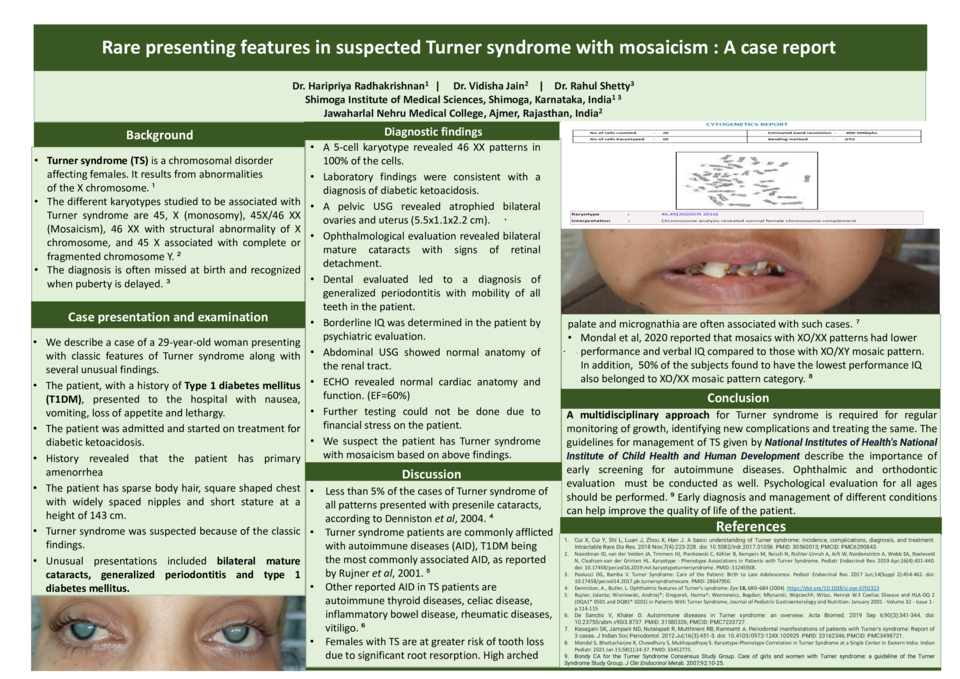Abstract
Rare presenting features in suspected Turner syndrome with mosaicism: A case report
Dr. Haripriya Radhakrishnan | Dr. Vidisha Jain | Dr. Rahul Shetty
Background:
- Turner syndrome is a chromosomal disorder affecting females. It results from abnormalities of the X chromosome.
- The different karyotypes studied to be associated with Turner syndrome are 45, X (monosomy), 45X/46 XX, 46 XX with structural abnormality of X chromosome, and 45 X associated with complete or fragmented chromosome Y.
- The diagnosis is often missed at birth and recognized when puberty is delayed.
Case presentation:
- We describe a case of a 29-year-old woman presenting with classic features of Turner syndrome along with several unusual findings.
- The patient, with a history of Type 1 diabetes mellitus, presented to the hospital with nausea, vomiting, loss of appetite and lethargy.
- The patient was admitted and started on treatment for diabetic ketoacidosis.
- History revealed that the patient has primary amenorrhea.
- The patient has sparse body hair, square shaped chest with widely spaced nipples and short stature at a height of 143 cm.
- Turner syndrome was suspected because of the classic findings.
- Unusual presentations included bilateral mature cataracts, generalized periodontitis and type 1 diabetes mellitus.
- A 5-cell karyotype revealed 46 XX patterns in 100% of the cells.
- Laboratory findings were consistent with a diagnosis of diabetic ketoacidosis.
- A pelvic USG revealed atrophied bilateral ovaries and uterus.
- Ophthalmological evaluation revealed bilateral mature cataracts with signs of retinal detachment.
- Dental evaluated led to a diagnosis of generalized periodontitis with mobility of all teeth in the patient.
- Borderline IQ was determined in the patient by psychiatric evaluation.
- Abdominal USG showed normal anatomy of the renal tract.
- ECHO revealed normal cardiac anatomy and function.
- Further testing could not be done due to financial stress on the patient.
- We suspect the patient has Turner syndrome with mosaicism based on above findings.
Discussion:
- Less than 5% of the cases of Turner syndrome of all patterns presented with presenile cataracts, according to Denniston et al, 2004.
- Turner syndrome patients are commonly afflicted with autoimmune diseases, T1DM being the most commonly associated AID, as reported by Rujner et al, 2001.
- Other reported AID in TS patients are autoimmune thyroid diseases, celiac disease, inflammatory bowel disease, rheumatic diseases, vitiligo.
- Females with TS are at greater risk of tooth loss due to significant root resorption. High arched palate and micrognathia are often associated with such cases.
- Mondal et al, 2020 reported that mosaics with XO/XX patterns had lower performance and verbal IQ compared to those with XO/XY mosaic pattern. In addition, 50% of the subjects found to have the lowest performance IQ also belonged to XO/XX mosaic pattern category.
Conclusion:
A multidisciplinary approach for Turner syndrome is required for regular monitoring of growth, identifying new complications and treating the same. The guidelines for management of TS given by National Institutes of Health's National Institute of Child Health and Human Development describe the importance of early screening for autoimmune diseases. Ophthalmic and orthodontic evaluation must be conducted as well. Psychological evaluation for all ages should be performed. Early diagnosis and management of different conditions can help improve the quality of life of the patient.





